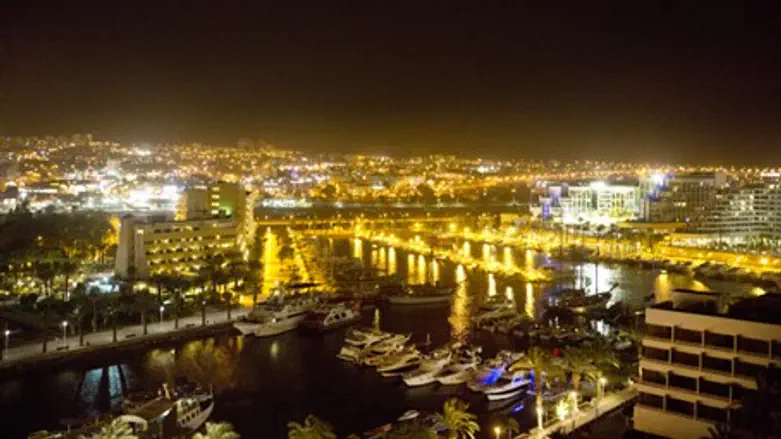
Prime Minister Binyamin Netanyahu held a discussion Tuesday regarding the establishment of a casino in the southern port city of Eilat.
Participants included the Minister of Tourism Yariv Levin, Transportation Minister Yisrael Katz, Director-General of the Prime Minister's Office Eli Groner and Director-General of the Ministry of Transportion Uzi Yitzhaki.
The establishment of casinos in Eilat is anticipated to contribute both in the fields of employment and tourism and recreation. However, the discussion raised issues such as who will be permitted to gamble (foreign residents or Israelis), and the economic viability of a casino operating in Israel.
The Prime Minister's office said that the purpose of the discussion was to deliberate the feasibility for a casino "with the intention to save the city of Eilat from an economic collapse and create thousands of jobs." Senior Likud officials said that those who oppose the idea now, before an organized program has been set, may change their minds when they realize their concerns are groundless.
It was decided that Minister Levin will head the committee, which will include members such as the Director-General of the Prime Minister's Office, the Director-General of the Ministry of Transportion, and representatives of the Ministries of Finance, Justice and Internal Security, as well as the mayor of Eilat.
Initial plans depict that the airport in Eilat will be cleared and a strip of casinos, convention centers and entertainment complexes will be established instead. The airport will be rebuilt bigger and better. The gambling complexes themselves, which will occupy a small area, will function by private operators under the close supervision and strict conditions of the gaming authority.
It was further discussed that tourists who hold foreign passports will be able to gamble without restriction. However, Israeli gamblers will face restrictions such as age, limited hours of entry, denials to welfare recipients, restriction to number of entries allowed, and a cap on the amount of betting permitted.
Education Minister Naftali Bennett harshly criticized the idea of opening casinos and said that the Jewish Home party would oppose the move: "Casinos contradict the values of our country, serve the strong and weaken the feeble. The casino will cause spiritual and bodily harm, and we will all pay the price. Israel is not Vegas - and will never be."
In response to Bennett, Levin said Jewish Home is merely "rolling its eyes in false righteousness and ignoring the enormous magnitude of illegal gambling which exists today in Israel, without offering any alternative or serious solution.”
“I anticipate government ministers to deal with the affairs of their office and not intervene with a matter they are unfamiliar with. The Jewish Home party will single-handedly bring Eilat to utter ruin,” said Levin.
Members of the Shas party also expressed opposition to casinos stating the move will not happen. “Casinos in Israel serve only the tycoons, the owners of capital, causing serious damage to the disadvantaged. We represent the poor and the weaker sectors of society and therefore vehemently oppose the establishment of casinos in Israel.”
Meretz also opposed the move and thus aligned themselves with the religious parties.
Feedback from Eilat: "Casino will contribute to the economy – as long as they are supervised"
The decision to set up to four casinos in Eilat was received with satisfaction among hoteliers in the southern resort city who see this as a catalyst to intake investments in infrastructure and foreign money.
Eilat Mayor Meir Yitzhak Halevi, also a member of the Committee regarding the establishment of casinos in Eilat, said: "Years ago, the city council passed a resolution supporting the establishment of a casino in Eilat as well as conference and exhibition centers."
Lior Raviv, CEO of the Isrotel chain, supports the notion of the establishment of a casino so long as it will be monitored and outside the hotel space: "I believe that a casino can contribute to the economy and tourism, but it must be regulated, even by the lottery or the government."
Yossi Ani, CEO of the Eilat underwater observatory, one of the city's oldest attractions, also welcomed the initiative: "A project of this magnitude would escalate the city in terms of infrastructure and revenue. There is hardly a tourist town in the world that does not have a casino. Crime the last thing to be feared as long as the casinos are monitored and run properly."
"I am convinced that there will be an economic growth along with the opening of the new international airport and the approval to build more hotels. However there must be close monitoring to prevent crime and deterioration of communities," said Robert Siboni, a city council member in charge of external relations.
The main objectors are the holidaymakers who come to Eilat. Many of them have spoken out against the construction of a casino in the city on the grounds that it will destroy the beauty of the city.
"A few years ago there were casino cruises in Eilat. I once got on one of them and saw how people gamble their money away and burn a hole in their pockets. (The casino) will lead families into poverty,” said a resident of Jerusalem.